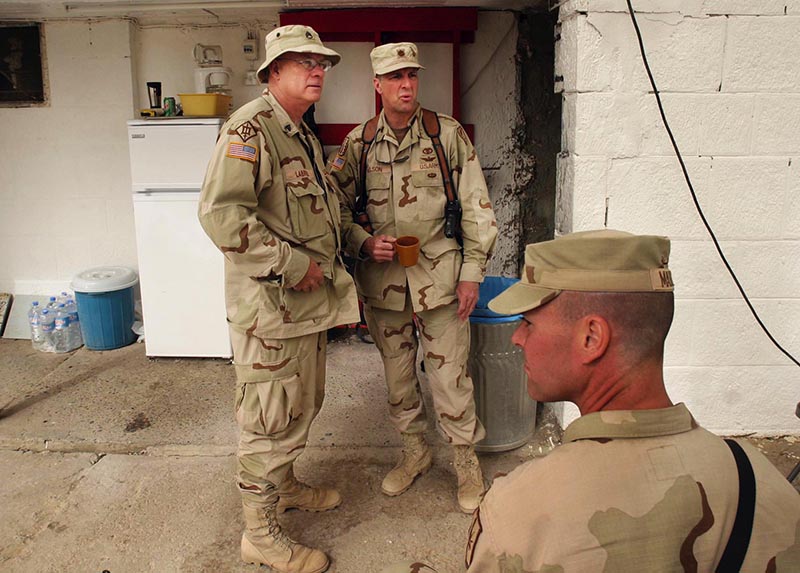Originally published Wednesday, Dec. 22, 2004.
A roadside ambush by anti-American insurgents left one Maine soldier dead and seriously wounded another Tuesday morning as their Maine National Guard convoy traveled along a divided highway on the western edge of Mosul.
The names of the soldiers, both members of the 133rd Engineer Battalion, were being withheld late Tuesday pending notification of their families, said Lt. Col. John Jansen, the battalion’s commanding officer.
Three other soldiers – two from Maine and one from a South Carolina unit attached to the 133rd – sustained minor injuries in the attack, which occurred while 12 soldiers in four Humvees traveled from Camp Freedom to a forward base just north of the town of Tall Afar.
“It’s really a hard thing,” said Jansen, after meeting with his senior staff Tuesday evening. “It’s very hard to prepare for what happened. There is risk here . . . and we do have a mission to do.”
The attack marked the first time the 133rd Engineer Battalion has sustained combat casualties since World War II.
The attack began around 9 a.m. Iraq time, when an “improvised explosive device” detonated on the median strip next to the convoy’s lead Humvee. The insurgents then opened fire with small arms on the soldiers, who returned fire and killed or seriously wounded four of the attackers, said Maj. Dwaine Drummond of Weeks Mills, the battalion’s executive officer.
After the brief firefight, an Army medical helicopter evacuated the two most seriously wounded soldiers from the scene to a field hospital at nearby Camp Diamondback.
Drummond said one soldier was flown to a military hospital in Baghdad, where he died upon arrival. The other soldier underwent emergency surgery at Camp Diamondback and was later transferred to Baghdad, where he was listed in “serious but stable” condition.
News of the attack spread quickly Tuesday morning across Camp Marez, where most of the 133rd Engineer Battalion is based. Long-distance telephones and Internet connections were shut down throughout the camp for most of the day, but lines were reopened by evening so soldiers could call and e-mail home.
Briefings with the soldiers from the convoy, conducted by Drummond two hours after the attack, revealed 30 minutes of horror and heroics:
The convoy began shortly before 9 a.m. at Camp Freedom, an ornate former palace of Saddam Hussein’s, where Jansen and a detachment of 22 soldiers from the 133rd Engineer Battalion are assigned. The palace serves as the regional military and political headquarters for northern Iraq.
The mission called for seven soldiers from the 133rd to escort five soldiers from South Carolina’s 268th Engineer Firefighters Detachment to a forward operations base, where the firefighters were to provide training and assistance to troops.
Ten minutes into the 40-mile trip, the explosion rocked the lead vehicle, setting it on fire. Immediately after the explosion, the insurgents opened fire from hiding places within the heavily developed neighborhood.
Some soldiers went to the aid of their wounded comrades, while others fired their M-16 rifles and automatic weapons at their attackers.
The insurgents then fled with their dead and wounded. Jansen, of Mount Vernon, said the soldiers moved about 1,000 meters up the road, where medical helicopters arrived within 15 minutes and reinforcements from the 2nd Infantry’s 3rd Stryker Brigade arrived within 30 minutes.
“What the soldiers did on that site was absolutely amazing,” Jansen said. “They not only engaged the threat, they got everybody out . . . to a place where they could start the medevac procedures right away.”
The 133rd arrived in northern Iraq in stages between late February and mid-March, replacing the Alabama National Guard’s 877th Engineer Battalion. That unit sustained no combat casualties during its 12-month deployment.
“I really didn’t believe this was going to happen,” said a somber Drummond after visiting the wounded at the field hospital earlier in the day.
Jansen said the battalion’s chaplain, Capt. David Sivret of Alexander, and the commanding officer of its medical unit, Maj. John Nelson, met individually with the soldiers involved in the attack. Mandatory “critical-event debriefings” will be held in the next few days to help them deal with the trauma, Jansen said.
Brig. Gen. Carter Ham, commander of Task Force Olympia, offered stress management teams to help the 133rd’s soldiers “work through the loss,” Jansen said.
A memorial service for the slain soldier will be held, but Jansen declined to provide details.
After Jansen met with senior officers for 30 minutes in Camp Marez’s Olive Garden Chapel, the officers fanned out among the battalion’s four companies to brief soldiers on the attack.
Soldiers were told the names of the killed and wounded, Jansen said, but were ordered not to reveal that information in any outbound communications from Camp Marez.
Company commanders “need to tell the soldiers what happened,” said Jansen.
The sprawling camp was quiet as darkness fell Tuesday.
“I think everybody feels a loss. This is a pretty tight group,” said Jansen, his bloodshot eyes reflecting the strain of the day’s events. “I think we’re going to have a lot of grieving – I see that immediately. And then I know we’ll pick up and move on.”
Sgt. 1st Class John Keene echoed that view as he went about his duties with the battalion’s headquarters support unit.
“Some people are crying,” Keene said. “There’s some anger toward the Iraqis – especially the insurgents. There’s some feelings of shock.”
Pausing for a moment, Keene added, “Above all there’s resolve. We’re pulling together.”
Staff Columnist Bill Nemitz can be contacted at:
bnemitz@pressherald.com
Send questions/comments to the editors.


